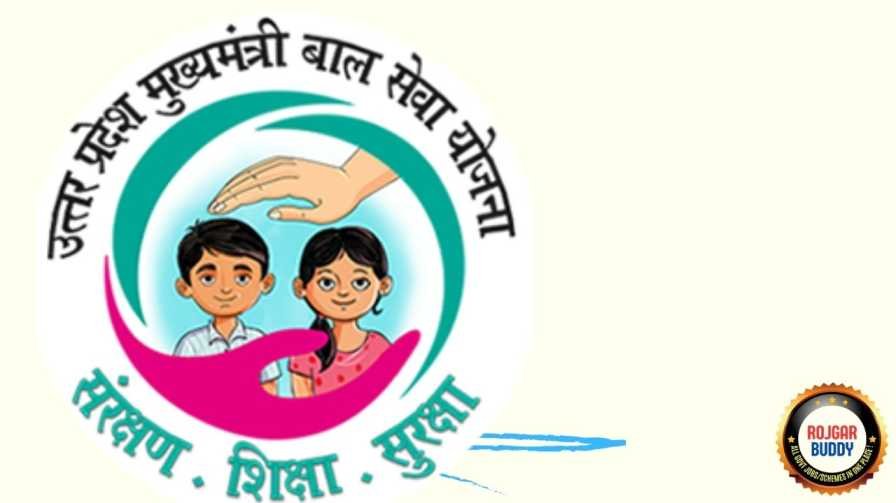Last Updated on July 27, 2024 by Rojgar Buddy Team

Mukhyamantri Bal Seva Yojana Uttar Pradesh : Recognizing the critical need for a secure and supportive environment in children’s developmental years, the Uttar Pradesh Chief Minister’s Bal Seva Yojana (General) initiative plays a crucial role.
This program extends assistance to minors under 18 who have lost one or both parents (not due to Covid), as well as young adults aged 18-23 who have been orphaned due to Covid-19.
The scheme not only provides financial aid but also aids students in pursuing higher education at government institutions following completion of 12th grade.
This includes support for achievers in national examinations such as NEET, JEE, and CLAT. Additionally, it offers assistance to children from divorced families or those affected by begging
Mukhyamantri Bal Seva Yojana Uttar Pradesh: Benefits
Financial Assistance: ₹2,500 per month.
Mukhyamantri Bal Seva Yojana Uttar Pradesh: Eligibility
Non-Institutional Children:
- Children under 18 who have lost both parents or one parent due to non-Covid related reasons.
- Adolescents aged 18-23 who have lost both or one parent due to Covid or other reasons, and are pursuing higher education after completing 12th grade.
- Children of divorced or abandoned mothers.
- Children whose parents or guardians are imprisoned.
- Children rescued from child labor, begging, or prostitution.
- Children from families involved in begging or prostitution.
Assistance will be provided to a maximum of two children per family. The annual family income for all categories of children should be less than ₹3,00,000, except in cases where both parents have deceased, in which case the income limit does not apply.
Institutional Children:
Children aged 0-18 who have previously lived in institutional care facilities and are now reintegrated into families or still residing in child care institutions. Support includes financial assistance and family/aftercare services to aid in their readjustment.”
Exclusions:
- Families currently receiving benefits from comparable schemes (excluding the Uttar Pradesh Chief Minister Bal Seva Yojana).
- Children aged 18 and above who opt out of pursuing higher education or competitive exams (eligibility ceases at 23 years of age or upon graduation/diploma completion, whichever is earlier).
Mukhyamantri Bal Seva Yojana Uttar Pradesh: Offline Application Process
Non-Institutional Children:
- Application Submission:
- Rural Areas: Submit applications to Village Development Officer, Gram Panchayat Officer, Block Development Officer, or District Probation Officer.
- Urban Areas: Submit applications to Accountant at Tehsil office or District Probation Officer.
- Requirements:
- Fill out the application form accurately, self-attest it, and include all necessary documents.
- Verification:
- Applications are verified by the Block Development Officer (rural) or Deputy District Magistrate (urban).
- Recommendation:
- Verified applications are forwarded with recommendations to the District Probation Office or Child Protection Unit.
Institutional Children:
- Identification:
- District Child Protection Unit and Child Welfare Committee directly identify eligible children.
- Application:
- Children or parents must submit applications within 15 days of identification.
- Supervision:
- A district-level task force oversees the Child Welfare Committee and Child Protection Unit to ensure timely application submissions from all eligible children.
Mukhyamantri Bal Seva Yojana Uttar Pradesh : Required Documents
For non-institutional category:
- Income certificate of the family (not required if both parents are deceased).
- Relevant records of parents, mother, father, or guardian, as applicable.
- Certificate of enrollment in an educational institution of the relevant category (not needed for children aged 0 to 5 years).
For institutional category:
- Order from the Child Welfare Committee/Juvenile Justice Board placing the child under institutional care.
- Age certificate of the child/adolescent (in addition to documents listed in Section 94 of the Juvenile Justice (Care and Protection of Children) Act 2015, such as a copy of the family register or any government document mentioning age).
- Certificate of admission to pursue a graduate degree or diploma from a government college, university, or technical institute.
- Certificate of passing national and state-level competitive examinations like NEET, JEE, CLAT, etc.
| Important Links | |
|---|---|
| Guidelines 2022 | Click Here |
| Guidelines 2021 | Click Here |
| Join Us On | Telegram | WhatsApp | Facebook |

